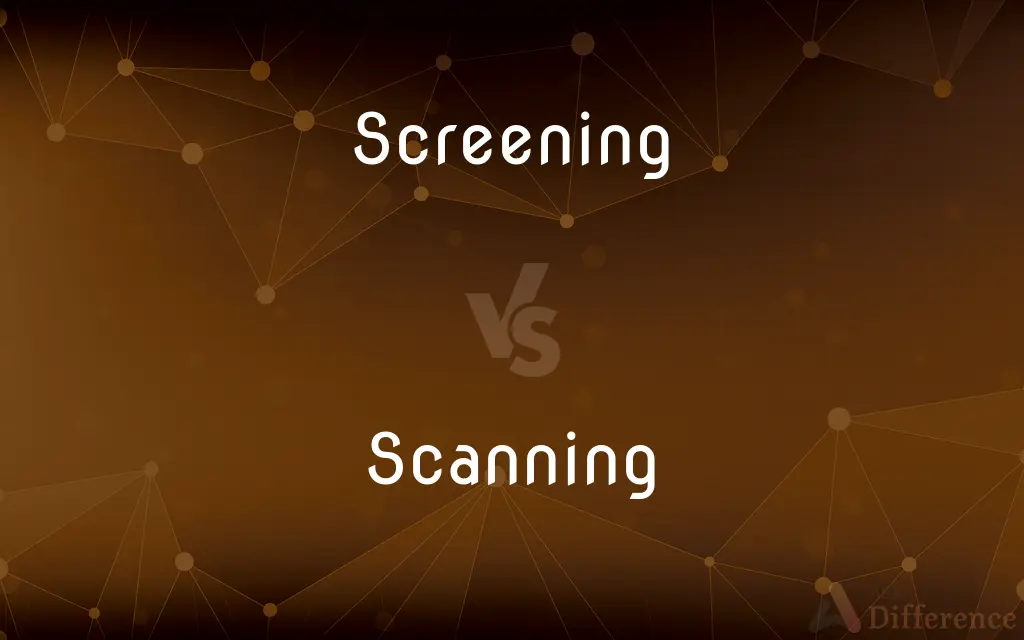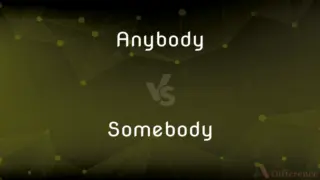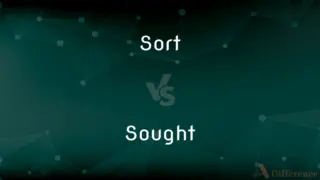Screening vs. Scanning — What's the Difference?
By Tayyaba Rehman & Urooj Arif — Updated on March 6, 2024
Screening involves a thorough check to identify any items that meet specific criteria, focusing on detection, whereas scanning is a quick look through material to find specific information or items, emphasizing speed.

Difference Between Screening and Scanning
Table of Contents
ADVERTISEMENT
Key Differences
"Screening" is a process used across various contexts, such as healthcare, security, and employment, to systematically evaluate individuals, luggage, or applications to detect anything unusual or identify those meeting predefined criteria. It often involves a detailed check and is used to ensure safety, health, or suitability. Conversely, "scanning" is a technique used to quickly look through material or space to locate specific information, items, or features. It is less thorough than screening and is aimed at speed rather than depth.
In medical contexts, screening refers to the examination of individuals to detect disease early in asymptomatic populations, such as cancer screenings, which involve tests designed to identify early signs of disease before symptoms appear. On the other hand, scanning in this context might refer to the use of imaging technologies, like MRI or ultrasound, to quickly look inside the body for any abnormalities, focusing on specific areas rather than a comprehensive check.
When it comes to security, screening involves checking individuals or their belongings for prohibited items or threats, such as at airport security checkpoints, where a systematic process is used to ensure safety. Scanning, however, could refer to the use of specific tools or machines, such as X-ray scanners, to quickly look through bags or cargo for contraband without the need for a detailed manual search.
In the context of document processing or information retrieval, screening might involve reviewing documents or applications to filter out those that do not meet certain criteria, requiring attention to detail and a systematic approach. Scanning documents or information, however, is about quickly searching for keywords, specific information, or summaries, often using digital tools or a cursory glance to find relevant details without an in-depth review.
The choice between screening and scanning depends on the objective: if the goal is to thoroughly check for compliance, suitability, or disease, screening is appropriate. If the goal is to quickly locate specific information or identify features without a comprehensive review, scanning is more suitable. Despite their differences, both processes are crucial in their respective fields for maintaining safety, efficiency, and effectiveness.
ADVERTISEMENT
Comparison Chart
Purpose
To systematically evaluate or detect specific criteria or abnormalities.
To quickly locate specific information or items.
Context
Healthcare, security, employment, research.
Information retrieval, document review, security.
Depth
Detailed and thorough.
Quick and superficial.
Focus
Ensuring safety, health, suitability.
Speed and efficiency in finding information.
Examples
Cancer screenings, background checks.
Searching for a name in a document, baggage X-ray.
Compare with Definitions
Screening
A process for evaluating or detecting specific criteria.
The airport conducts thorough screening of passengers for security.
Scanning
Using technology to look inside something.
The doctor recommended scanning the knee for a better diagnosis.
Screening
Filtering information or data based on predetermined criteria.
Screening research articles for relevant studies saves time.
Scanning
A brief review to locate items or features.
Scanning the crowd, she spotted her friend.
Screening
Examination to detect disease in asymptomatic individuals.
Annual health screenings help in early disease detection.
Scanning
Quickly looking through material to find information.
Scanning the menu, she quickly found her favorite dish.
Screening
Reviewing applications to identify suitable candidates.
The company's screening process for new hires is rigorous.
Scanning
Searching for specific keywords or information in a document.
He was scanning the report for the financial summary.
Screening
Systematic checking of baggage for prohibited items.
Security screening at events ensures the safety of attendees.
Scanning
Superficial examination to identify immediate information.
Scanning the book's index, he located the needed chapter quickly.
Screening
Screenings (used with a sing. or pl. verb) Refuse, such as waste coal, separated by a screen.
Scanning
To look at carefully or thoroughly, especially in search of something; examine
The sailor scanned the horizon for signs of land.
Screening
The mesh material used to make door or window screens.
Scanning
To look over quickly or read hastily
I scanned the newspaper while eating breakfast.
Screening
A presentation of a movie.
Scanning
(Computers)To search (stored data) automatically for specific data.
Screening
A systematic examination or assessment, done especially to detect an unwanted substance or attribute.
Scanning
To direct a finely focused beam of light or electrons in a systematic pattern over (a surface) in order to reproduce or sense and subsequently transmit an image.
Screening
(uncountable) Mesh material that is used to screen (as in a "screen door").
I'll have to buy some screening and fix the doors before mosquito season starts.
Scanning
To direct a radar beam in a systematic pattern across (a sector of sky) in search of a target.
Screening
The process of checking or filtering.
The airports are slow now because the pre-boarding screening is so inefficient.
Scanning
To encode (text, for example) in digital format by means of an optical scanner.
Screening
The showing of a film
Scanning
(Medicine)To direct x-rays or other energy at (a body or body part) in order to produce an image, as with a CT scanner.
Screening
The examination and treatment of a material to detect and remove unwanted fractions
Scanning
To pass (luggage, for example) through a detector at a security checkpoint in order to detect weapons or banned materials.
Screening
(in the plural) Material removed by such a process; refuse left after screening sand, coal, ashes, etc.
Scanning
To analyze (verse) into metrical patterns.
Screening
(soccer) shielding
Scanning
To analyze verse into metrical patterns.
Screening
(medicine) A method to identify a disease in a population which is not showing any symptoms of this disease.
Scanning
To conform to a metrical pattern
Does this line scan?.
Screening
(volleyball) Action done by the serving team to prevent the opposing team from seeing the server and the flight path of the ball.
Scanning
The act or an instance of scanning
My scan of the files.
Screening
Present participle of screen
Scanning
The action or process of scanning a body or body part.
Screening
The process of examining or testing objects methodically to find those having desirable properties. See screen{3}.
Scanning
An image produced by scanning.
Screening
The display of a motion picture
Scanning
Present participle of scan
Screening
Fabric of metal or plastic mesh
Scanning
The act of something being scanned.
Screening
The act of concealing the existence of something by obstructing the view of it;
The cover concealed their guns from enemy aircraft
Scanning
The process of translating photographs into a digital form that can be recognized by a computer
Screening
Testing objects or persons in order to identify those with particular characteristics
Scanning
The act of systematically moving a finely focused beam of light or electrons over a surface in order to produce an image of it for analysis or transmission
Common Curiosities
Can scanning be part of a screening process?
Yes, scanning can be a preliminary step in a screening process to quickly identify areas or items that require deeper examination.
Is screening always related to health or security?
While often associated with health and security, screening is also used in employment, research, and other areas where a systematic check is needed.
What is the main difference between screening and scanning?
Screening is a thorough evaluation to detect specific criteria, while scanning is a quick search for specific information or items.
Can screening be used for quality control?
Yes, screening is often used in quality control to ensure products meet specific standards before reaching the market.
Can technology replace human screening and scanning processes?
Technology can enhance both processes, especially in scanning, but human judgment is often necessary, especially in complex screening scenarios.
Is one method better than the other?
Neither method is inherently better; the choice depends on the objective, whether it's depth and thoroughness (screening) or speed and efficiency (scanning).
Why is scanning important in information retrieval?
Scanning allows for efficient location of specific information in a large volume of data or documents, saving time and resources.
How do screening and scanning contribute to safety?
Screening helps detect threats or diseases early, enhancing safety and health, while scanning can quickly identify potential risks or important information.
How has digitalization impacted scanning processes?
Digitalization has significantly improved scanning efficiency, allowing for rapid search and retrieval of information through digital documents and databases.
How do screening and scanning affect productivity?
Properly implemented, both can enhance productivity by ensuring only suitable candidates or items proceed in a process, while quickly locating necessary information.
Share Your Discovery

Previous Comparison
Anybody vs. Somebody
Next Comparison
Sort vs. SoughtAuthor Spotlight
Written by
Tayyaba RehmanTayyaba Rehman is a distinguished writer, currently serving as a primary contributor to askdifference.com. As a researcher in semantics and etymology, Tayyaba's passion for the complexity of languages and their distinctions has found a perfect home on the platform. Tayyaba delves into the intricacies of language, distinguishing between commonly confused words and phrases, thereby providing clarity for readers worldwide.
Co-written by
Urooj ArifUrooj is a skilled content writer at Ask Difference, known for her exceptional ability to simplify complex topics into engaging and informative content. With a passion for research and a flair for clear, concise writing, she consistently delivers articles that resonate with our diverse audience.
















































